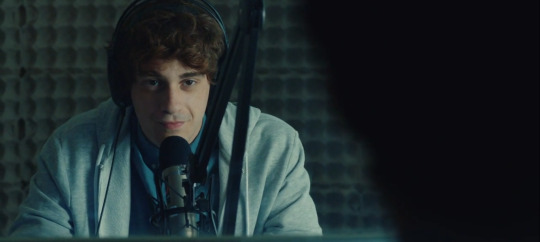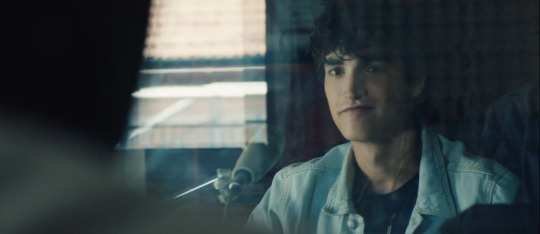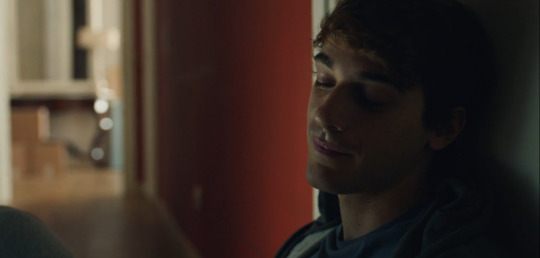#but he lacks the internalized homophobia which is a key element of the Cool Guy
Text
as you may know, reading tumblr posts about Dean Winchester is an experience surprisingly akin to auditing classes on gender performance and masculinity at a graduate level media studies program. at least if you read enough of them.
which unfortunately I have! and now I have some thoughts.
see, there are character archetypes that crop up over and over again, and particularly often in 90s and 00s genre TV shows. I am vastly oversimplifying, but let’s boil them down to the Three Main Kinds Of Dudes you are most likely to see in these shows.
Let’s start with the Guy Who’s Not Cool, And Knows It. he’s all over the place: he’s Xander on Buffy, and later Wesley. he’s Julian Bashir, Rodney McKay, Seth Cohen and (at least early on) Alec Hardison. he’s usually not the main character, but he’s up there in the main credits.
and he’s textually, overtly anxious about his masculinity. this is something that other characters comment on, and sometimes he admits to it himself. his long-term character arc is — at least in part — about resolving that anxiety, confronting it and growing past it over time.
(he’s also, often, a self-insert for the guys in the writer’s room. but we don’t have time to unpack all of that.)
our second category is a bit more of a grab bag, because in some ways it covers all the guys who don’t fit into categories 1 or 3. but, broadly, we can call him the Guy Who Doesn’t Need To Make A Big Deal Out Of It. he’s the guy who comes across as quietly secure in his masculinity, who has nothing to prove on that front and whose story doesn’t need to be about proving it. Sometimes he functions as a foil for the Anxious Guy, sometimes he’s just quietly ticking along in the parts of the story that aren’t about Proving anybody’s Manliness. He’s Giles and Oz and Gunn, Eliot Spencer, Ronon Dex, Benjamin Sisko.
and then there’s the Cool Guy.
the Cool Guy is a main character, or he has top billing in an ensemble cast. the Cool Guy is a walking, talking grab-bag of heroic mannerisms. He’s tough and strong and he doesn’t talk about his feelings. he’s a ladykiller. he’s a flirt. he has the popular imagination version of Captain Kirk’s personality, and the popular imagination version of Han Solo’s sex appeal. he kills bad guys and drops a witty one-liner afterwards. he can fly a plane, or a spaceship, or drive a cool car or ride a motorcycle. he walks away from explosions without flinching. he’s not doing this ironically. he’s not performing. he’s just Cool.
as written, he has the depth of a cardboard standee.
but he’s played by an actor who’s, you know, a real human person, and wants his character to have some kind of interiority. so this weird alchemy happens, over and over again.
here’s the thing about that grab-bag of Cool Guy traits and mannerisms: there are real men, in real life, who do most of those things. and most of them probably aren’t overcompensating for anything! but also? none of them have the whole grab-bag. They have, like, two at most.
no one does all of them unless they’re doing them on purpose — unless they’re putting on a performance. but the Cool Guy as written isn’t performing. and the actor playing him has to embody that impossible character while giving him some kind of depth.
So what happens? Dean Winchester. John Sheppard. All the Cool Guys who are meant, textually, to be Effortlessly Performing Masculinity... and subtextually read as desperately overcompensating for their queerness.
whoops!
and somehow tv writer’s rooms keep doing this! they think that if they just pile on more Cool Guy traits, they’ll make the performance convincing, when they’re actually just undermining him more and more.
(sometimes the Cool Guy isn’t even meant to be heroic! the writers of Smallville tried, as far as I can tell, to make Lex Luthor come across as a suave, worldly, sophisticated ladykiller. what they got was a man who makes way-too-intense eye contact with a buff farm boy while suggestively drinking fancy bottled water.)
(also I didn’t watch Teen Wolf but I am given to understand that Derek falls in this category? and Stiles is for sure an archetypical Anxious Guy.)
the thing about the Anxious Guy is that because his anxious masculinity is textual, it can be addressed and resolved in the text. Because the Cool Guy is not textually performing, not textually anxious, he just has to keep on being that guy without the text ever acknowledging that there’s anything weird about it. and all the while the subtext is screaming that this! man! is! trying! too! hard!
and we as viewers with eyes in our heads can see that tension, between what’s said and what’s shown, and tbh most of the time the simplest and most obvious way to resolve it is to say “ah. okay. that man is Not Straight.”
so that’s why Dean Winchesters keep happening. thank u for coming to my ted talk.
#long post#meta#dean winchester#i think Eliot Spencer is the closest any TV show has ever gotten to a successful Cool Guy#but he lacks the internalized homophobia which is a key element of the Cool Guy#also speaking of thing we don’t have time to unpack right now:#did you notice that the Cool Guy is always white? and the Anxious Guy usually is too but not quite as universally#so yeah. also there’s that#media studies#the Cool Guy#the plato’s allegory of the cave version of the cw’s supernatural
14K notes
·
View notes
Text
Issue #11 - Why should you watch SKAM Italia?

Not everyone seems capable of empathy. Be it towards a stranger or someone they’re close with, not every person can relate to someone else’s way of thinking and being, to the pain they feel, or connect with the way they are. It’s not the end of the world that you can’t do that, after all in life we can learn anything, but some people just don’t seem ready to do it.
This becomes evident during the time in our life when we don’t know about a lot of things--and I’m not talking about childhood, but adolescence. During that time we aren’t sure of the world we live in and how it affects us, yet we want to seem like we are kings and queens of this place. And in the midst of that mess of emotions, sometimes we forget about other people. We forget that they suffer as much as we do, if not more.
But when we factor in love, all forms of it, there’s always the chance of finding common ground between us and them, those that can’t empathize and those that need our empathy.
And whether you agree with me or not, most of the stories of our time revolve around this concept. People that can’t understand each other coming together through mutual feelings, coming together through the good things that unite us. And from that moment, there can be a new type of connection, something that can either last forever or just a day--but if you want it to last for the longest while, the act of understanding another person is key.

SKAM is a series originally from Norway, and it tells the stories of teenagers from different backgrounds in the same school, orbiting around the lives of one of them per season. The format was exported to countries around the world, and now there’s a lot of different versions from the original one, most of the time containing similar elements and plot lines--and if you’ve watched one, chances are you’re going to know what’s going to happen in another.
However, that doesn’t mean you can’t enjoy all of the seasons and series, which is why this rec is about the Italian version of SKAM. And since we’re talking about queer storylines, my focus is on the second season of SKAM Italia.
The main characters in this are Martino and Niccoló, two guys that meet during some extracurricular activities in school after they try to run away from said activities.
Martino at first didn’t even know he was being flirted at, seeing that this was the first time he realized some other boy seemed to show attraction for him. And up until that moment, he identified himself as straight, although he wasn’t sure why, or didn’t want to see why his feelings were convoluted inside.
Niccoló, for his part, plays the cool kid seemingly with more experience than Martino, but that wasn’t a deterrent for feelings to develop. He is shrouded in mystery throughout most of the series, and his erratic behavior at times confounds Martino but doesn’t impede him from feeling the connection.
As soon as it becomes clear that Martino is falling for a guy, he starts to question himself about where does this comes from, and how can he approach it. He hides from everyone at first, even though not many aspects of his current life are impacted by homophobia or any kind of prejudice. Most of what he feels comes from his own internalized rejection.
And that’s not really much of a surprise to a gay kid of any age.

It’s hard to find a niche where we are accepted, but more than that, it’s hard to make the niche we belong to accept us. Or at least that’s how we see life. But in a very progressive series tackling this topic, Martino finds in his friends the acceptance he needs to overcome some of the fear of having a relationship with another guy, and this brings all of them closer, although it has to pull them apart first.
Still, the story isn’t just about their relationship and the acceptance of other people. As I mentioned before, this story is about empathy, about understanding the things other people go through. Martino is a good kid for the most part, but it’s clear to see from the beginning that he can’t really relate to other people, or doesn’t want to make the effort.
That’s fine and all, especially if the people he encounters along the way don’t really make an impression in his life. But there are people in his immediate surroundings that need his empathy, and one of them is his mother.
Throughout the series we see her problems driving them apart, but mostly because Martino doesn’t want to understand what’s going on with her. And a part of me can get that. It’s hard for a kid to be the strong rock in the family, to be the presence that calms other people, or just be the one that can nod his head when someone else just needs to vent.
He ignores her pleas to spend time together, ignores her woes when it seems like she won’t be able to live her life to the fullest, and even though it’s not his job to take care of her, as this is not something we are born assigned to, Martino could at least try to see the situation through her eyes.
And he just doesn’t seem to be able to. Or want to.

Of course, this exact lack of understanding and empathy comes to haunt him back when he finds out that the guy he’s been falling in love with also has problems--because in fact, all of us have them. Be it in any sphere of our lives, nothing is perfect, and there’s always room for improvement, but sometimes it’s hard to do it.
I’m being vague about what are such problems these people in Martino’s life go through because it’s part of the plot and it’s important to the developments that happen in the series, but the theme of understanding what other people go through is always there.
It’s especially cathartic to see other people not being able to empathize with what Martino goes through because it begs for him to look inward and understand what happens with himself so he can change.
And change he does, in the end.

It’s important to mention that I wanted to talk about this version of SKAM because it has a lot more important content and nuance to the relationships and because it feels more natural than the original series, though I have to say both are good and worth the watch. However, this version is much more developed and the chemistry between the characters is even more on fire--and that’s always a plus.
What I like the most about SKAM, though, is the fact that it exposes the reality of our days and the things we have to go through in our lives. It’s fiction, but it draws a lot from real situations, always sprinkling some fictional magic here and there to make everything be a part of a happy ending.
But just because life might not have one, it doesn’t mean we can’t enjoy the good things while they last. In SKAM we see the kids doing just that, falling in love and being a bit crazy, but it’s all in good nature. It’s all part of a bigger process that’s called developing character.
If at the end of the line we can be better people because of it, more power to all of us.
That’s why you should watch SKAM Italia.

18 notes
·
View notes